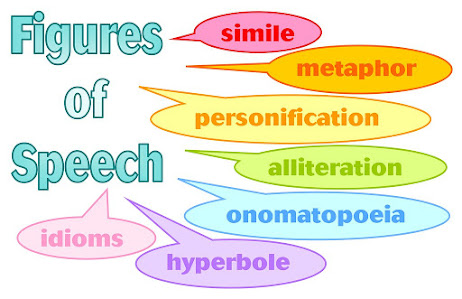English
English is the international language as well as the major subject.
This page contains the lesson that i had learned in class.
Yesterday, we had learned about the Homonyms and Homophones.
HOMONYMS
Is the word which have same sound and same spelling but different meaning.
Example: Can-Can ring-ring fan-fan bear-bear watch-watch
HOMOPHONES
Are the words which have same sound but different spelling and meaning.
Example: know-no right-write ate-eight buy-bye sell-cell
Yesterday, we learned about the Personification and Hyperbole :
Personification: The attribution of a personal or human characteristics to something non-human, or representation of an abstracts quality in human form.
Example: You can hear the trees whispers in the dark.
The stars dance in the mid-night sky.
the flowers are begging for water
The sun smile down on us
Hyperbole: Is the extreme exaggeration used to emphasize a point.
Example: She cried a river
I can eat horse
I am freezing
His brain is size of pea
Today, we learned about the structure of the sentences, there are three types of the sentence structure are:
1 Simple Sentence
A sentence consisting of only one clause, with single subject and predicate.
Example: He loves to play football
I don't wash the dishes
We see them every week
2 Compound Sentence
Is a sentence that has at least two independent clause joined by a comma, semicolon or conjunction.
Example: I went to the market, and I bought some milk
Although my father has many friend, but he is lonely
I am not going to shower when you will come
3 Complex sentence
A complex sentence is one independent clause and one more dependent clause.
Example: Because he was late again, he would be docked a day's pay
While i am a passionate basketball fan, I prefer football
Although she was considered smart, she failed all her exams.
Figure of Speech
Auxiliary Verbs (Helping Verbs):
Example: She is running. (The auxiliary verb "is" helps form the present continuous tense.)
Modal Verbs: These verbs are used to express possibility, necessity, or other moods.
Common modals: can, could, may, might, must, shall, should, will, would
Example: He can swim. (The modal verb "can" indicates ability.)
Regular Verbs: These verbs form their past tense and past participle by adding -ed to the base form. Example: walk → walked → walked
Irregular Verbs: These verbs do not follow the regular pattern of adding -ed to form the past tense and past participle.
Phrasal Verbs: These verbs consist of a main verb combined with one or more particles (prepositions or adverbs) to create a new meaning.







nice
ReplyDelete